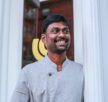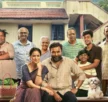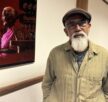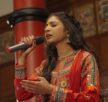

An Interview with Tishani Doshi
- 30th October 2012
- POST IN :LIFESTYLE
Tishani Doshi was born in Chennai, India to Welsh-Gujarati parents. At the age of 18 she left India to pursue a degree in Business Administration in North Carolina, which is where she developed a love for the literature of the American South. After working in the Harper’s and Queen advertising department in London for one year, she moved back to India in 2001. Here, she – at the age of 26 – embarked on a career as a dancer, working with esteemed choreographer and writer, the late Chandralekha. She is also a freelance journalist who has written for a number of publications including the Guardian and the New York Times. Tishani has won awards for her books in the past, and this year at the South Asian Literature Festival in London she will be presenting poems from her latest book "Everything Begins Elsewhere" in a 45-minute music and poetry recital which is a collaborative effort with Max Ablitzer.
We caught up with this multi-talented lady to find out more…
Your website’s tagline is "Poet, dancer, writer, wanderer…" You do so many things! Your life must be pretty hectic, right?
Yes and no. At the moment it feels particularly mad, but I’m looking forward to the end of November when I’ll be back by the sea in Tamil Nadu where everything slows down. I lead a slightly schizophrenic life with periods of much travel and conversation, interspersed with periods of solitude and writing. I wouldn’t have it any other way, but obviously maintaining a balance is tricky and hectic in and of itself.
You’ve changed your career path a number of times. Did you feel unfulfilled before you settled on writing/dancing?
Being unfulfilled is a basic requirement for a writer… but it’s the kind of lack of fulfilment I prefer over the lack of fulfilment of a 9-5 desk job. In terms of changing career path – I’ve never understood the question of what do you want to be … Why does it have to be one thing? Why not two, why not five? I didn’t choose to become a dancer, it just happened. It’s certainly the most fulfilling thing in my life I’ve done so far. I can only hope that more unscheduled careers come my way.
How did you get into dance, and what form(s) of dance do you perform now?
I started to dance early in a very unserious way. My first dance performance was at age three. I was a flower. I continued with dance – mainly Indian folk dance, till I was 14 when I gave it up for tennis. I never harboured any ambitions to be a dancer, but when I decided to move back to Madras in 2001 I met a magnificent woman called Chandralekha who asked me to work with her, and I agreed. Chandra’s choreography was incredibly abstract and contemporary – stripped of narrative, but very rooted in Indian forms like Yoga, Bharatanatyam and Kallaripayattu. Since she passed away in 2006 I’ve continued to perform her last choreographic work, “Sharira”, with the troupe.
Do you find that you can use dance to inspire your writing, and vice-versa?
Absolutely. This is the great benefit of not sticking to single compartments. Things feed off each other and into each other. From dance I learned the discipline necessary to be a writer. From writing I learned vulnerability – and the strength that comes with that vulnerability, which is particularly useful when you’re on stage in front of hundreds of people.
You currently live in a village by the sea in Tamil Nadu. That’s certainly a far cry from the busy life you must have lived whilst working in London. Do you prefer a more chilled-out atmosphere?
I love cities, but after a while they can really tear into you. I figured out some years ago that the best way for me to enjoy cities was not to live in them but pass through them. When I visit London now I appreciate it far more than I ever did when I lived here. And yes, I prefer a slower pace, I prefer not living in a shoebox, and living by the ocean, and clean air, and less noise. All those things are luxury for me.
Your parents are Welsh-Gujarati, and you were brought up in South India. Although you spent the first 18 years of your life in Chennai, did you ever find yourself feeling like an outsider?
I think I’ve felt like an outsider ever since I’ve been a young child – not in a terrible way, but in a curious way of observing the world from outside, rather than feeling like you’re on the inside of things. I don’t feel particularly Welsh or Gujarati. If I had to align myself, I’d probably say I’m more Madrasi than anything else, particularly when it comes to my food preferences – Masala Dosa, Idli Vada and Curd rice are my favourites!
What can we expect from "Everything Begins Elsewhere" at the South Asian Literature Festival?
It’s a collaboration between words and music, which began with a conversation on a train a year ago. As a poet it has been one of my preoccupations – how to bring your work to a larger audience? So many people are put off poetry for whatever reasons – that it’s boring, inaccessible, doesn’t speak directly to their experience. I think that poetry is the most potent form available to us, and I’d like to get more people to think that. Working with music and trying to bring it to a wider audience is one way of doing that.
What’s next for you? Have you started work on your next project?
I’m working on a novella called Fountainville, which was commissioned by Seren publishers. It’s a contemporary re-telling of one of the myths of the Mabinogion.
Catch Tishani on November 3rd at the South Asian Literature Festival in London, where she will be presenting poems from her latest book. Click here for tickets, and check out more about the festival here.
- Previous Post
The Entrepreneurial Way






















